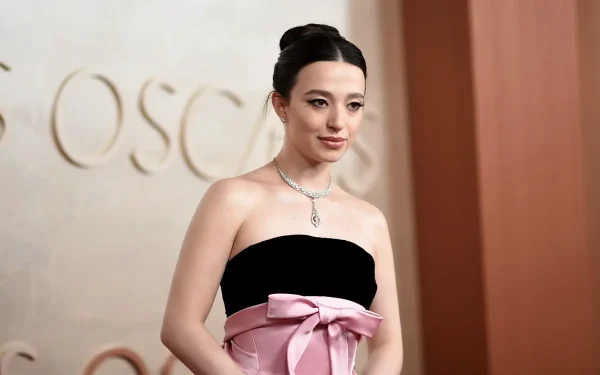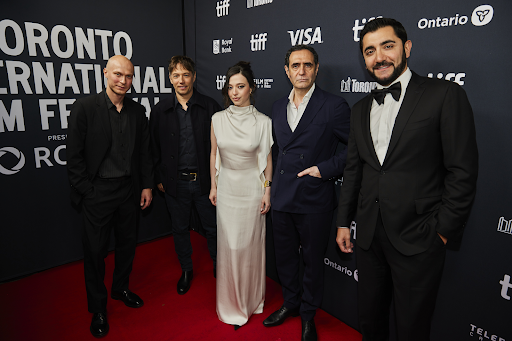Neon’s 2024 film Anora, directed by Sean Baker and starring actress Mikey Madison, has gained widespread acclaim, from the Palme d’Or at the Cannes Film Festival to several Academy awards. Despite having a budget of just around 6 million dollars, Anora’s has been a raging success, shooting Sean Baker and his cast to stardom. However, Anora is not Baker’s first venture, as he has also directed many other award-winning films like Tangerine (2015) and The Florida Project (2017). Furthermore, this is not Baker’s only film that openly discusses sex work or other taboo topics. By that as it may, this indie project managed to differentiate itself from the rest of Baker’s discography, and also other great films in contexts like the Oscars, from Denis Villenueve’s Dune 2 (2024) to Coralie Fargeat’s The Substance (2024). Overall, Anora’s creativity and uniquely compelling story turned it into a stunning reflection of the landscape of the film world, and lives in the modern era.
Anora has been called a modern Cinderella story, or a modernized Pretty Woman (1999), but with a twist. Set primarily in Brighton Beach, Brooklyn, the story follows an escort (the titular Anora) as she meets and gets married to Ivan (Vanya) Zacharov, the son of a powerful Russian family, in the span of a week. Later, it then exhibits the ensuing hijinks of said family in their effort to annul the marriage. During her first days with Vanya, she spends New Year’s Eve with him, seemingly signifying a new, happy beginning for her. Yet, the film dupes us; the saccharine of the first two acts of the film, where she and Ivan (or Vanya) party through New York City and Las Vegas, stand in stark contrast to the jarringly bleak final act, where both Anora and the audience are brought back down to reality. Although much of the film is comedic, playing on both American and Russian pop culture to create some hilarious moments, the tragic ending characterizes Anora as a dramedy.
As mentioned, Anora unfolds as a Cinderella tale. Though Anora never explicitly says she is unhappy with her job or her life, her loneliness is explicitly conveyed. Her glittery hair tinsel, which shines in the bright, neon lights of the club that she works in, mimics the bright but coy persona she cultivates at work. With her colleagues, she tends to be outspoken and confident. Yet, as the film shows us, when the night is over and she returns home, she is exhausted and, for the most part, alone. Now, the tinsel mocks her as she takes the subway in silence to a gloomy house (and a roommate whom she obviously hates).
Later, she enters Vanya’s extravagant, hedonistic life. As a client, Vanya wants someone who speaks Russian, and thus comes Anora. Their conversation in this moment also tells us about Anora’s estrangement from her family and Russian culture, embodied by how she chooses to go by Ani as opposed to Anora. Here, our curiosity is peaked: who exactly is Anora, or Ani? Nevertheless, our senses soon get bombarded by the loud lights and even louder music of Anora’s week of partying and married life with Vanya. Her engagement ring itself sparkles too: “three carats” minimum, she insists.
However, Baker turns the gold-digger trope on its head. He asks the audience to see each and every character, like the outside of what predetermined roles we might give them. Though Anora herself may seem to fit the role, when she brags to her friends about marrying a Zakharov, or insisting on expensive presents, it is in the smaller, quieter moments that we can see how vulnerable she is. Baker hints that she does not want money for the extravagance, but the security it would provide in her life. For her honeymoon, she does not ask for another Vegas adventure, or a Bahamas vacation, but for a trip to Disney World and a stay in the Cinderella suite, which she says has been her dream “since I’ve been a little girl.” As the film goes on, she begins to show less and less regard for the material goods Vanya gives her, and more so the marriage itself. She destroys the expensive decorations in Vanya’s house in an attempt to duck the annulment, and discards the Russian sable coat Vanya gives her, but clings onto her ring for dear life. This speaks to who Anora truly is, and what she desires at her core – the love and security of family.
Similarly, a thug hired by the Zakharov family called Igor is initially presented as just that – brutish and unrefined, but his sweetness quickly starts to challenge all that we might have assumed about him. A story within a story, Anora also houses romance between Anora and one of the men that the Zakharov family sends to separate her and Vanya. Both members of the working class, Anora and Igor develop a quiet kinship. Though she continuously insults him, he treats her with far more respect and care than anyone in the film.
As a foil to Vanya, Igor underscores the class struggle between Anora and the Zakharovs. Vanya’s immaturity, which manifests in everything from his demeanor to his clothes, are much more grating when we have Igor’s sensitivity to compare it to. Even in the face of Anora’s mean comments (and punching, at one point), Igor is never mean or even rude in return (despite the fact that, through Yuri Borisov’s excellent portrayal, we can see he is hurt by her). Yet, we see Vanya coddled by his parents, allowed to return to a high position in his father’s company in spite of years of partying, and Igor still being mistreated at work. Perhaps this is why Anora lashes out at Igor – he reminds her of her own original circumstances, and that in the end, Vanya, the Zakharovs, and the upper class as a whole, were always going to mistreat her too. Together, they both try to earn respect for themselves and others in the working class. Igor is the only one to tell the Zakharovs “it’d be appropriate if Ivan apologizes” for his betrayal of Anora, and the only one among the goons to hesitate at smashing up an old man’s small candy score just to score some information. Yet after everything, they are both ultimately discarded by the rich, emblemized by their single night in a hollow shell of Vanya’s mansion after the family vacates it.
Anora is highly character and story-driven, but the visuals of the film are also rich with symbolism that impart the tragedy. The saturated hues and metallics at Anora’s work or Vanya’s parties contest the dull neutrals that clothe the people who clean his house, or even the human sculpture that supports his glass living room table. So, when Anora is forced to part with Vanya’s glamour, and is altogether disillusioned about her dreams, the scenes themselves lose their vibrancy. Another example of visual cues are the butterfly motifs. One may typically associate a butterfly with metamorphosis, or transformation, but the film ties it back to class. With Vanya, Anora’s nails are adored with bejeweled butterflies and later, she sports a t-shirt with a skeleton butterfly. On top of that, his cleaning lady Klara wears a butterfly hair clip, and Vanya’s father alludes to Anora’s work as her being a “night butterfly.” At first, the butterfly imagery tells us that Anora can finally escape her struggles through Vanya. However, as the butterflies surrounding Anora get less colorful, and we see how they are tied to the working-class lifestyle, it becomes obvious that Vanya will not bring about this change.
Someone who did change, however, was Madison herself; without her artful transformation into Anora, the film would not be what it is. According to Madison herself, the role and film were crafted by Baker for her specifically. In interviews, both of them have discussed the various aspects of her preparation for the role. In an interview with W Magazine, Madison describes having taken months of pole dancing classes and visited strip clubs in order to accurately portray sex workers in the film, and gain further insight into her character. She has since received widespread recognition for Anora, receiving “Best Actress” at the Oscars this year, and also for her past projects.

Besides the social commentary Anora gives rise to, another aspect of its appeal is the special structure of its story. Although the other characters and the audience can predict what will happen early on, it is this very doomed nature of the plot that makes the film. Anora’s work rival openly bets her marriage will not last two weeks, and behind the camera, we ourselves can see Mark Eydelsteyn’s (Vanya’s actor) eyes wandering as he talks to her. Though Anora herself may deny it, the signs are there, and we cannot help but let our hearts break for her. For such a jaded person, Anora still herself lets herself have one final, naive hope, which unfortunately gets shattered by the end. We spend so much time rooting for her, and for her Cinderella ending, even though we know she will not win. Anora’s popularity may suggest that people are craving less of an unrealistic, happy ending in the mainstream.
Additionally, Anora’s mastery of themes like class struggle, emotional vulnerability, breaking free of predetermined parts, and familial distance may hit close to home for many viewers. In a world of uncertainty, wracked by war and controversy, and where mental health rates have been declining all over the world, Anora’s peek into life in such a society is all too relevant. Anora would never have been able to be a part of the Zakharovs even when she married one, so her loneliness as she is left without her family or Vanya’s is not only a commentary on class, but an honest, raw reflection of the times. Where we can be brought further and further apart by world events, the Internet, and so much more, Anora can be seen as a story of people struggling for love and connection in a world of indifference.

